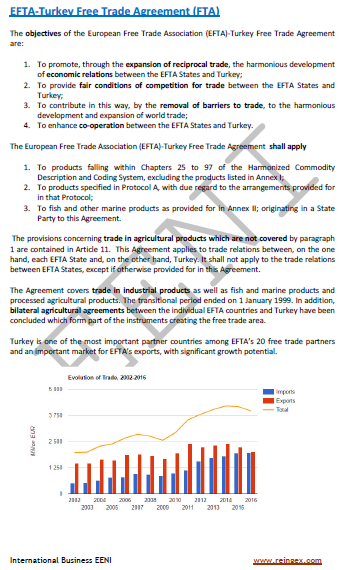European Free Trade Association-Turkey

Free Trade Agreement between the EFTA States and Turkey. State Aid
- Introduction to the Turkey-EFTA Agreement
- Topics covered by the Turkey-EFTA Agreement
- Foreign Trade between Turkey and the EFTA Countries

The Subject “Turkey-EFTA Free Trade Agreement” belongs to the following Online Programs taught by EENI Global Business School:
Masters adapted to:
 Turkish Students
Turkish Students- EFTA Students:
 Iceland,
Iceland,  Liechtenstein,
Liechtenstein,  Norway,
Norway,  Switzerland
Switzerland

Sample - EFTA-Turkey Free Trade Agreement:

Entry into force of the EFTA-Turkey Free Trade Agreement: April 1992
The Free Trade Agreement between the EFTA States and Turkey was the first Free Trade Agreement signed by the EFTA.
The main objective of the EFTA-Turkey Free Trade Agreement is to set-up a free trade area through the Trade Liberalization (Customs Duties elimination and Technical Barriers to Trade removal).
The EFTA-Turkey Free Trade Agreement covers:
- Trade in Goods
- Government procurement
- Intellectual Property Rights
- Competition
- State Aid
- Joint Committee
- Dispute Settlement
- ...

Bilateral agreements on basic agricultural products between the EFTA States and Turkey.
The rules of origin of the EFTA-Turkey Free Trade Agreement are based on the Pan-Euro-Mediterranean model.
The EFTA States belong to the European Economic Area and Turkey to the Central Eurasian Economic Area (Islamic Civilization).

(c) EENI Global Business School (1995-2024)
We do not use cookies
Top of this page







